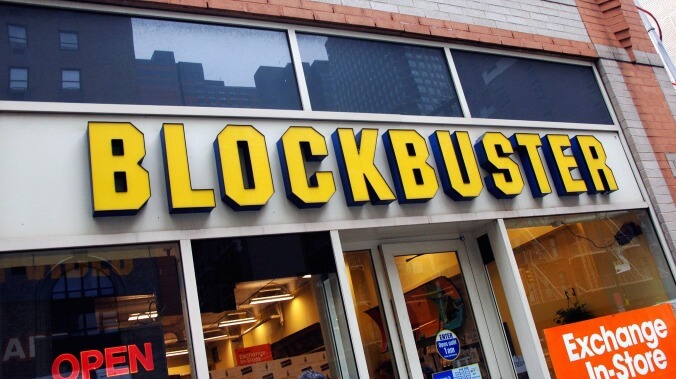Blockbuster nostalgia, which is to say, nostalgia for the video rental chain that put independent video stores out of business, is at an all-time high. And you know who loves all-time highs for its algorithmic dominance, the company that ruined Blockbuster, Netflix.
This is a long time coming for Netflix and the final humiliation for Blockbuster. In 2000, Netflix co-founders Marc Randolph and Reed hastings attempted to sell their fledgling company to their then-massive competitor Blockbuster for $50 million. Now they’re making a TV show about the last Blockbuster. We’d say you can’t write this stuff, but Ramos, Caspe, and Clark are literally writing this stuff.
It’s understandable as to why people are so nostalgic for Blockbuster. This writer, too, has fond memories of renting everything from The Jerky Boys Movie to Wrestlemania X at the once-reigning king of rentals. But as Vulture points out, the place wasn’t that great, especially for [ahem] the art of cinema. Writer and former Blockbuster employee Jason Bailey wrote:
Once Blockbuster’s market dominance had been established, the chain never missed an opportunity to flex its muscles. The company’s strict “R-rated and under only” policy not only meant that its stores lacked the “adults only” rooms typical of so many early video stores (and eyeballed by so many young video store customers, hello). Their policy also forced filmmakers who dared craft movies for adults — released as unrated or with the MPAA’s dreaded NC-17 — to create entirely different, often incoherent “R-rated” cuts for the chain, lest they lose that lucrative home rental income altogether. And thus curious viewers were subjected to bowdlerized versions of films like Requiem For A Dream, Bad Lieutenant, and Crash (no, the good one) if they lived in one of the many, many cities where Blockbuster was their only video store. And sometimes they weren’t even given that option; when Martin Scorsese’s controversial Last Temptation of Christ arrived on VHS in 1989, the chain refused to stock it altogether.
Of course, what we’ve got now, algorithmically determined selections that are memory-holed upon release (remember Red Notice) while smaller titles get buried in streaming libraries that grow bigger by the second, ain’t much better. Soon, we’ll be adding Blockbuster onto Netflix’s seemingly endless digital shelves. It’ll sit nicely next to The Last Blockbuster documentary that’s currently streaming on Netflix.

 Keep scrolling for more great stories.
Keep scrolling for more great stories.
